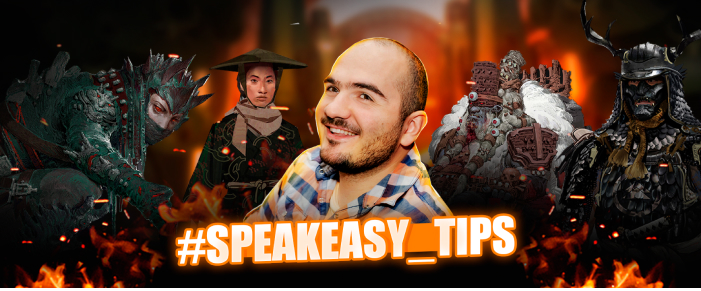
Portfolio Review with Horia Dociu. Devoted SpeakEasy E11 Highlights
Continue reading "Portfolio Review with Horia Dociu. Devoted SpeakEasy E11 Highlights"
Because of the COVID-pandemic we’ve seen a lot of industries that were struggling with the new conditions of today’s world, while the gaming industry was booming. It created a lot of opportunities for many companies to strengthen their position in the market. The question is, how do you do it? That is why we dedicated this episode to learn what the whole process of raising venture capital is and how can one make their company attractive.
Richard: The first thing I’d love to see is a micro-level understanding of what you’re building and what your right to build this thing is. One should ask themselves, what they know about this thing that very few other people do whether it comes from personal experience or personal interests, but it has to be something that keeps you motivated throughout the very difficult process of building a company.
The other thing I want to see is not in the pitch, it is something you get from personal communication and video calls. It is how founders interact with each other because it is so important to have a shoulder to cry on when you’re building those things because of many unexpected obstacles that can punch you in the face. It gives an idea of how founders would go through hard times.
I also want to get a sense of the track record of a team and its ability to navigate all of the challenges of building a studio.
And I guess we need to talk about a market element as well: if it is a venture-backable opportunity because there’s a tone of cool ideas that just don’t have venture-level scales.
The last thing I would like to point out is what your unfair advantage is. The idea can be very rare and unique but it’s quite rare to find founders who can not only find important insights from their experiences but also go and execute them. We have to be convinced that not only do these people sell a potentially very big idea, but rally the people needed to make it happen.
 Sam: Games are interesting because they are unlike films, TV shows, and a lot of other things that we’ve seen. With games you don’t have to make your best piece of content the day you release it, in fact, you almost never will. It is very special because in gaming you have an opportunity to refine, rework, iterate on, and really build the content experience which is going to be forever changing, particularly in the games that we are especially interested in. Games are being operated on and built over time, that’s why you just want to make sure that you’ve got the people that have the creative vision and edge, and experience to create and develop a game, but also ship a game, market it from its release through its lifecycle, build a community, and so on. Those are the things that are not available in other forms of content and are really unique. So we pay a lot of attention to that; we constantly remind ourselves that our specific creative preferences may or may not be determinative.
Sam: Games are interesting because they are unlike films, TV shows, and a lot of other things that we’ve seen. With games you don’t have to make your best piece of content the day you release it, in fact, you almost never will. It is very special because in gaming you have an opportunity to refine, rework, iterate on, and really build the content experience which is going to be forever changing, particularly in the games that we are especially interested in. Games are being operated on and built over time, that’s why you just want to make sure that you’ve got the people that have the creative vision and edge, and experience to create and develop a game, but also ship a game, market it from its release through its lifecycle, build a community, and so on. Those are the things that are not available in other forms of content and are really unique. So we pay a lot of attention to that; we constantly remind ourselves that our specific creative preferences may or may not be determinative.
 Sam: We had a case of a project with two founders, one of them was well-known and established within the industry and at the first meeting, he introduced his younger co-founder, saying that with his 20 years in the industry this guy was the most incredible engineer he came across. And this is a very good example that by no means do you need to be a known celebrity but you need to really have the goods as a founder and as somebody that is backable. Even better when you’re somebody that the world doesn’t know yet.
Sam: We had a case of a project with two founders, one of them was well-known and established within the industry and at the first meeting, he introduced his younger co-founder, saying that with his 20 years in the industry this guy was the most incredible engineer he came across. And this is a very good example that by no means do you need to be a known celebrity but you need to really have the goods as a founder and as somebody that is backable. Even better when you’re somebody that the world doesn’t know yet.
Okay, I’ve decided my product is good enough and I have an audience and other elements to it that I’m going to go out and raise money for. Do I go and google “venture funds near me” or do I go to a consulting company and pay them some percent of how much money they raise so they do the introductions? Or do I go LinkedIn, and then how do I find the venture fund? How does the whole process work?
 Sam: Richard and I certainly believe that venture is going to evolve into specialized sector-focused funds and teams of people that really have deep expertise in the particular area that they are focused on. And in the case of interactive content and technology, it is a relatively new thing that they are sector-focused funds. Even 3-4 years ago there hasn’t been such a thing as funds focused on interactive content, and probably this tendency is going to spread to other industries. So if you are a founder in an interactive sector, you probably going to prepare a list of companies that make investments in your sector. It’s still a small enough space in the universe of investors. You can look in Pitchbook which helps you identify which firms have been out there or which deals have been done, or ask your industry colleagues for a piece of advice or intros; make connections on LinkedIn or keep in touch with latest industry news.
Sam: Richard and I certainly believe that venture is going to evolve into specialized sector-focused funds and teams of people that really have deep expertise in the particular area that they are focused on. And in the case of interactive content and technology, it is a relatively new thing that they are sector-focused funds. Even 3-4 years ago there hasn’t been such a thing as funds focused on interactive content, and probably this tendency is going to spread to other industries. So if you are a founder in an interactive sector, you probably going to prepare a list of companies that make investments in your sector. It’s still a small enough space in the universe of investors. You can look in Pitchbook which helps you identify which firms have been out there or which deals have been done, or ask your industry colleagues for a piece of advice or intros; make connections on LinkedIn or keep in touch with latest industry news.
As for the agencies, I feel like there are very few early-stage companies that are engaging bankers to raise money for them. There is only a couple of really credible and high-quality interactive-content-focused bankers, around there, so we have actually only a couple of projects in our portfolio that have been introduced to us through bankers. So if the company comes to us from trusted bankers who really have some trusted expertise in the industry, we understand that it is going to be a terrific deal. But the same strategy is not going to work with a pretty random or unknown consultancy firm.
 Rhys: I believe that a good founder is always making the relationships and connections for the future, they are always having conversations, but they don’t necessarily go out and hardcore pitch to raise the next round until they figured out a kind of timeline. You don’t want to be out of money when you raise successfully your next round either; you want to have a little bit of cushion and you know it is probably a six-months process at least. So you just kind of do the backward maths, that’s what I’ve seen from the guys I work with.
Rhys: I believe that a good founder is always making the relationships and connections for the future, they are always having conversations, but they don’t necessarily go out and hardcore pitch to raise the next round until they figured out a kind of timeline. You don’t want to be out of money when you raise successfully your next round either; you want to have a little bit of cushion and you know it is probably a six-months process at least. So you just kind of do the backward maths, that’s what I’ve seen from the guys I work with.
 Sam: I think we’ve made 20 investments since March 2020, so we’ve absolutely invested during and throughout the pandemics, the first batch of those projects was discussed prior the COVID-19. Actually, we started working on most of these projects prior to the lockdown. For those that we started working on later, the process depended on how the introduction was made. We either made the first call for real warm introductions to me or Richard directly. And most of the companies we’ve invested in are those we’ve known the founders before. But we also have a procedure that after a short introduction or an e-mail exchange, we give an opportunity to spend some time with our team so that we could have a closer look and evaluate the project properly. The team forms an opinion and shares it with us, and they usually know our tastes and preferences, so it usually works well.
Sam: I think we’ve made 20 investments since March 2020, so we’ve absolutely invested during and throughout the pandemics, the first batch of those projects was discussed prior the COVID-19. Actually, we started working on most of these projects prior to the lockdown. For those that we started working on later, the process depended on how the introduction was made. We either made the first call for real warm introductions to me or Richard directly. And most of the companies we’ve invested in are those we’ve known the founders before. But we also have a procedure that after a short introduction or an e-mail exchange, we give an opportunity to spend some time with our team so that we could have a closer look and evaluate the project properly. The team forms an opinion and shares it with us, and they usually know our tastes and preferences, so it usually works well.